

iGoogle. 10'000 hours. Dr. Carol Dweck on Fixed vs. Growth Mindsets. Carol Dweck: The Effect of Praise on Mindsets. Carol Dweck: Mindset interview. Matthew Syed - The Importance of Self Belief - A Tom Bates Coaching Interview. BOUNCE - How Champions are Made, Matt Syed. BBC Meet the Author - Matthew Syed. The Invisible Mentor. László Polgár. László Polgár (born 11 May 1946 in Gyöngyös), is a Hungarian chess teacher and father of the famous "Polgár sisters": Zsuzsa, Zsófia, and Judit.
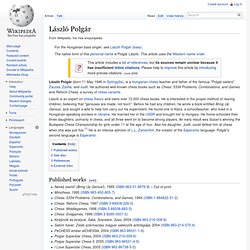
He authored well-known chess books such as Chess: 5334 Problems, Combinations, and Games and Reform Chess, a survey of chess variants. László is an expert on chess theory and owns over 10,000 chess books. He is interested in the proper method of rearing children, believing that "geniuses are made, not born". Before he had any children, he wrote a book entitled Bring Up Genius! , and sought a wife to help him carry out his experiment. Published works[edit] Nevelj zsenit! See also[edit] Boris Sidis – The psychologist and social scientist whose educational experiments are credited for the genius of his famous son William James Sidis References[edit] External links[edit] Klara & Laszlo Polgar. Klara & Laszlo Polgar My parents are not strong chess players, although they may deserve an honorary grandmaster title for bringing up three champions.
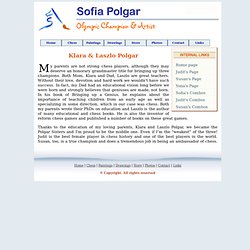
Both Mom, Klara and Dad, Laszlo are great teachers. Without their love, devotion and hard work we wouldn't have such success. In fact, my Dad had an educational vision long before we were born and strongly believes that geniuses are made, not born. In his book of Bringing up a Genius, he explains about the importance of teaching children from an early age as well as specializing in some direction, which in our case was chess. Thanks to the education of my loving parents, Klara and Laszlo Polgar, we became the Polgar Sisters and I'm proud to be the middle one. Interesting Stuff: Laszlo Polgar - Creator of Geniuses. The 10,000-Hour Lie: Malcolm Gladwell's Outliers. Here's a lie you've probably heard recently: Being great at something takes 10,000 hours of practice.
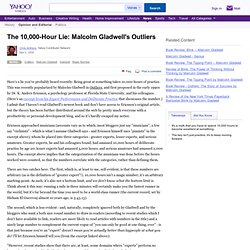
This was recently popularized by Malcolm Gladwell in Outliers, and first proposed in the early 1990s by Dr. K. Anders Ericsson, a psychology professor at Florida State University, and his colleagues. (Here's an excerpt from his Expert Performance and Deliberate Practice that showcases the number.) I admit that I haven't read Gladwell's newest book and don't have access to Ericsson's original article, but the theory has been further distributed around the web by pretty much everyone with a productivity or personal-development blog, and so it's hardly escaped my notice.
Ericsson approached musicians (accounts vary as to which; most bloggers just say "musicians", a few say "violinists" - which is what I assume Gladwell says - and Ericsson himself uses "pianists" in the excerpt above), whom he placed into three categories - greater experts, lesser experts, and serious amateurs. DeliberatePractice(PsychologicalReview).pdf (application/pdf Object)
Which Traits Predict Success? (The Importance of Grit) What are the causes of success?
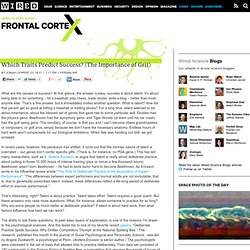
At first glance, the answer is easy: success is about talent. It’s about being able to do something – hit a baseball, play chess, trade stocks, write a blog – better than most anyone else. That’s a fine answer, but it immediately invites another question: What is talent? The Expert on Experts. K. Anders Ericsson. K.
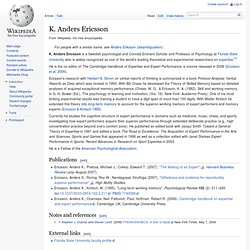
Anders Ericsson is a Swedish psychologist and Conradi Eminent Scholar and Professor of Psychology at Florida State University who is widely recognized as one of the world's leading theoretical and experimental researchers on expertise.[1] He is the co-editor of The Cambridge Handbook of Expertise and Expert Performance, a volume released in 2006 (Ericsson et al. 2006).
Ericsson's research with Herbert A. Simon on verbal reports of thinking is summarized in a book Protocol Analysis: Verbal Reports as Data, which was revised in 1993. With Bill Chase he developed the Theory of Skilled Memory based on detailed analyses of acquired exceptional memory performance (Chase, W. Currently he studies the cognitive structure of expert performance in domains such as medicine, music, chess, and sports, investigating how expert performers acquire their superior performance through extended deliberate practice (e.g., high concentration practice beyond one's comfort zone). Publications[edit] The Making of an Expert.pdf (application/pdf Object)